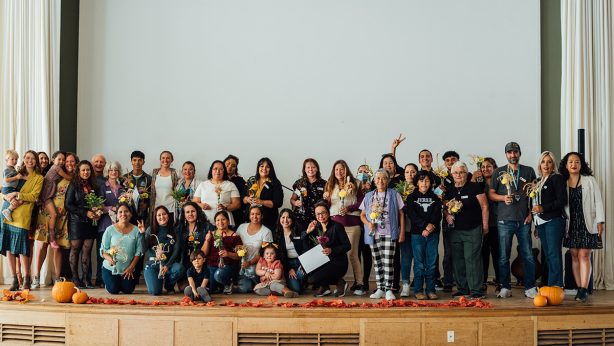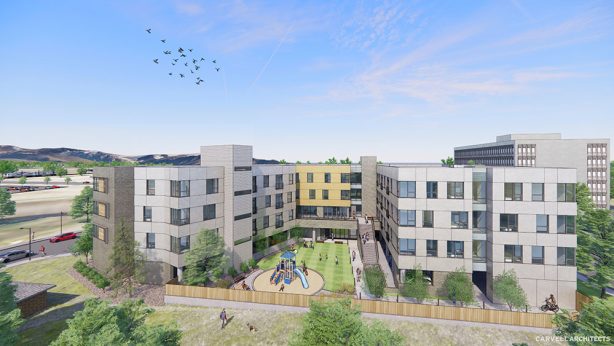Neighborhood Focus: Northeast Park Hill
Northeast Park Hill Neighborhood Update
Urban Land Conservancy (ULC) works to help make affordable real estate options available for the Denver Metro area and the greater Front Range. We acquire, develop, and preserve physical assets and partner with neighborhoods to help meet their critical community needs.
One of the many neighborhoods ULC is proud to work with is Northeast Park Hill. ULC has a rich history with Northeast Park Hill and has developed strong and enduring relationships with community members. Read more below on ULC’s outcomes in Northeast Park Hill.
The Holly
When the Holly Shopping Center, located at 3347 Holly Street, was burned down in May of 2008, the community chose to use it as an opportunity to re-envision and redevelop this critical neighborhood destination. The City of Denver approached ULC soon after the fire to purchase 2.6 acres and finalized the purchase in the spring of 2009. With financing help from the City and Citywide Banks, ULC has continued to work alongside Northeast Park Hill residents, led by the Holly Area Redevelopment Project (HARP) and The Denver Foundation’s Strengthening Neighborhoods Program, to move the community’s vision forward for redevelopment to the best long term uses of Holly Square. In addition to Strengthening Neighborhoods engagement work, HARP’s success was largely due to local stakeholders including The Hope Center, the Pauline Robinson Library, the Hiawatha Rec Center, Prodigal Son, and the visioning work of Community by Design.
In the early 2010s, ULC initiated a Request for Statements of Interest for Holly Square occupancy, geared towards organizations that recognized the value of the Holly and which were guided by HARP’s vision and guiding principles. HARP presented ten proposals to the community and provided residents the opportunity to meet the potential organizations and decide which one would be the best fit for the neighborhood.
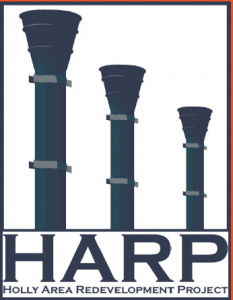
In August of 2012, the Boys & Girls Club of Denver signed a long term land lease with ULC for construction of the Nancy P Anschutz Community Center, and in 2015, ULC worked with HARP to identify a second long-term development partner to build a community-driven facility on the west side of the property. Roots Elementary School was selected by the community and opened in August of 2016.
Unfortunately, Roots closed its doors in 2019, but because ULC retains ownership of the land under the school building in a 99-year ground lease, we were able to return to HARP and re-engage the community in a process to select a new tenant for the building. The Center for African American Health, the selected group, moved into the building earlier this year with the intention of purchasing the Hudson building from ULC within the next three years. As with the elementary school, The Center for African American Health will own the building and ULC will continue to own the underlying land in its community land trust to ensure permanent community benefit of this important real estate asset to the neighborhood.
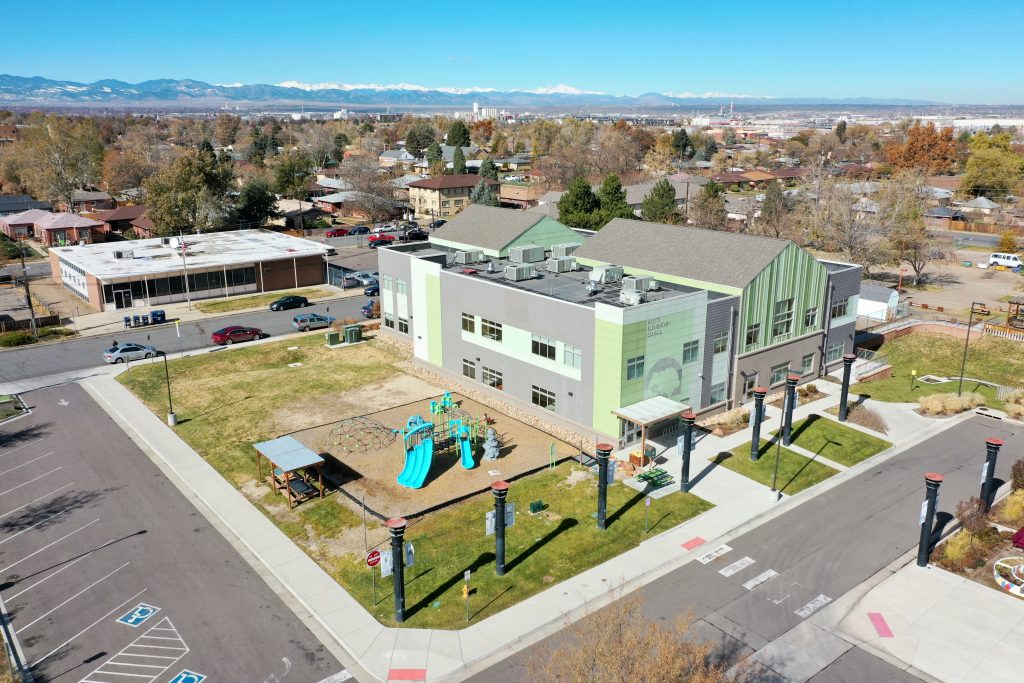
Dahlia Apartments
ULC acquired the Dahlia Apartments, located at 33rd and Dahlia, in December of 2009, after it was foreclosed on. . The property consists of six buildings with a total of 36 two-bedroom apartment homes serving over 100 residents.
This affordable housing preservation site was critical as Denver’s market faced a housing crisis. Without ULC’s intervention, it would likely have become market-rate rental units. The property was the first to utilize financing through the Denver Transit-Oriented Development Fund (TOD Fund) the federal Neighborhood Stabilization Program. Since 2009, ULC has completed several capital improvement projects including weatherization, new roofs, windows, decks and a community playground.
ArtWay North
ArtWay North is a transit-oriented transit oriented development located in Northeast Park Hill next to the 40th and Colorado Commuter Rail Station and 40 bus line route. ULC purchased the 9.4-acre site for ArtWay North in 2013 using the Denver Transit-Oriented Development (TOD) Fund, along with support from The Piton Foundation and Gary Community Investments.
In the spring of 2013, ULC partnered with Radian, a non-profit architecture and urban design group, to lead a year and a half community engagement process to determine future development plans. The process resulted in three site design concepts that include small retailers, residential assumptions, and completed streets. It also resulted in five neighborhood principles that should be a part of future developments: public realm, integrated accessibility, quality of life, arts and culture, and social equity.
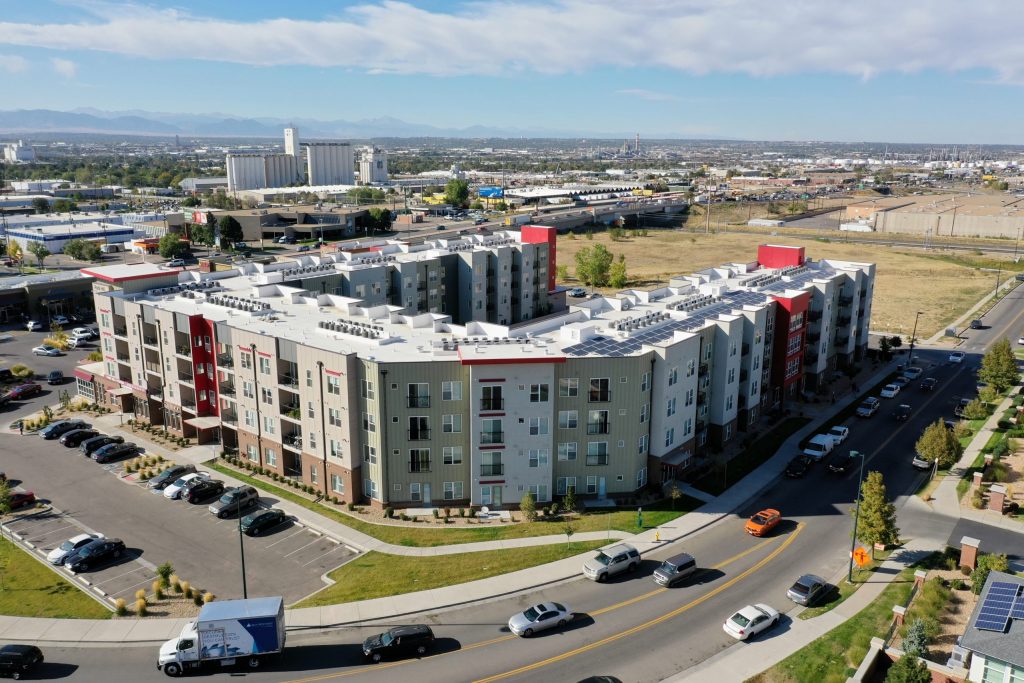
In the summer of 2014, ULC sold 2.7 acres to Delwest, a real estate developer, to develop affordable apartments in partnership with the Denver Housing Authority (DHA). Delwest broke ground on the Park Hill Station Apartments in 2014, which include 156 units of permanently affordable housing. In 2016, Park Hill Station Apartments celebrated a grand opening. Due to the affordable nature of the apartments and their proximity to the A-Line commuter Rail connecting Union Station to DIA, the apartments were immediately 100% leased.
In April of 2017, ULC and Birdseed Collective celebrated the premier art installation on the 303 ArtWay Heritage Trail. The mural was funded by ArtPlace American and Denver Arts and Venues PS You Are Here Program.
ULC is now in the process of developing future plans including additional permanently affordable rental housing and a commercial space serving community organizations. Stay tuned for more!
303 ArtWay Heritage Trail
The 303 ArtWay Heritage Trail is a future four-mile bike and pedestrian loop connecting RTD’s A-Line Commuter Rail Station with Holly Square in Northeast Park Hill. The Heritage Trail is a community-driven development and relies on local community stakeholders to flesh outthe future urban path. 303 ArtWay intends to highlight the visionaries, artists, leaders, and community activists who have brought life to the historically unique and diverse neighborhood, while increasing safety and connectivity through the Northeast Park Hill Community.
In 2015, fundraising for conceptual planning and design began. Over 1000 residents of Northeast Park Hill were surveyed to determine Phase I of development and over 93% of respondents indicated their belief that 303 ArtWay is important to the community. After a year- and-a-half community outreach process, led by Northeast Transportation Connection and PlatteForum, ULC completed a premier art installation—a 120 foot long brightly colored mural that incorporated designs from both the African-American Kente blanket and the Hispanic Serape blanket and increased lighting adjacent to the 40th and Colorado Station.
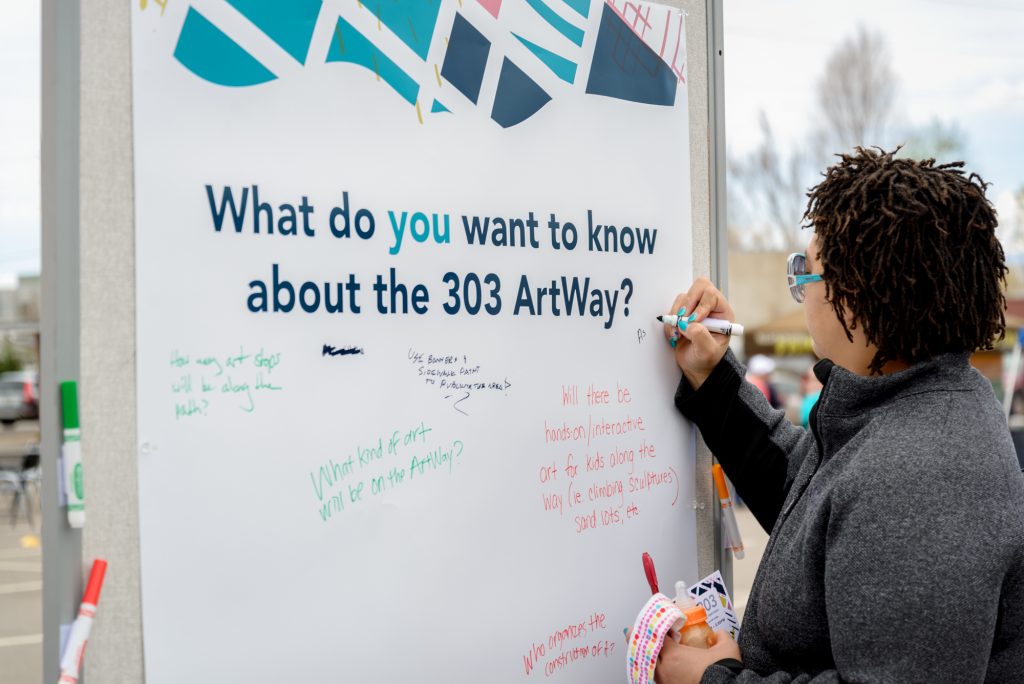
In 2018, ULC re-launched its community engagement efforts to determine key community priorities for the Heritage Trail. In partnership with local residents, community organizations, and neighborhood stakeholders, 303 ArtWay created a goal action plan and steering committee to guide the future development of the trail.
In May 2020, the 303 ArtWay team finalized a corridor study documenting key milestones throughout 2019. The 70-page report, produced by Radian, reflects a year’s worth of work. In addition to providing an overview of 303 ArtWay’s progress, the report also dives into the key findings and recommendations discovered along the way, such as the need for additional lighting along major streets and more crosswalks and curb bump outs to calm traffic and improve pedestrian safety. The 303 ArtWay team is actively engaged with partners such as the City of Denver’s Department of Transportation and Infrastructure (DOTI), Safe Routes to School, the Denver Streets Partnership, and VisionZero to turn the community’s recommendations into reality.
Please click here to read the 303 ArtWay Corridor Study in full. The Corridor Study was generously funded by The Colorado Health Foundation’s Activating Healthy Places & Spaces grant, which paved the way for the launch of the team’s next phase, creation of a corridor master plan and engineering and design work for program implementation. This work is expected to begin later this summer and will be led by ULC, Radian, and The Trust for Public Land. The Trust for Public Land is also providing further funding for the next phase of important, neighborhood-centered work.


